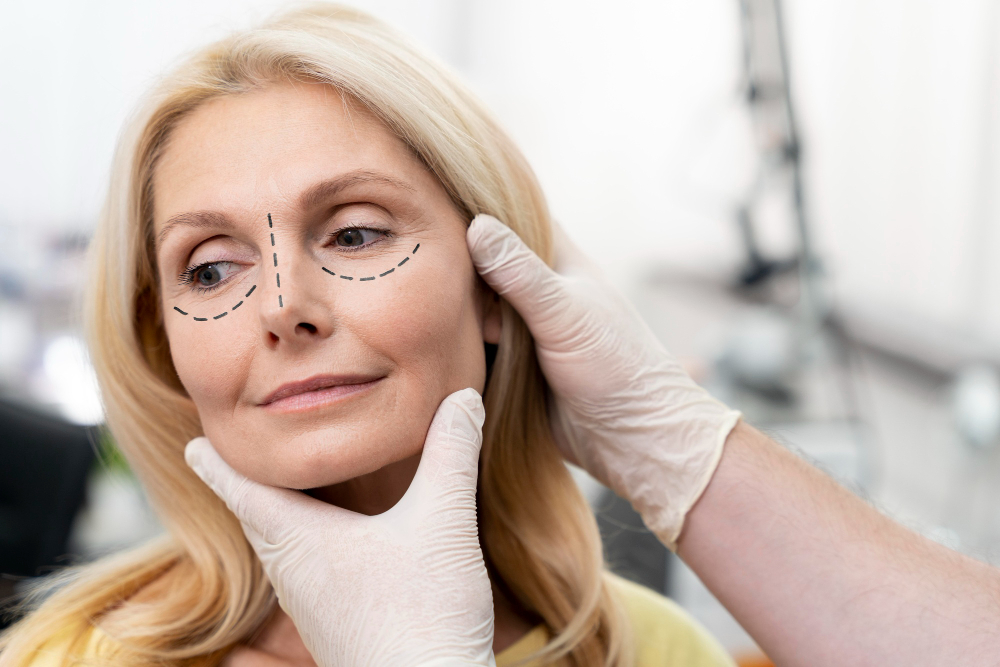Working Time
- Mon-Friday 09AM to 04PM
Contact Info
-
Phone: 0121-794-2369
07595-895851
Ask the Experts
Eyelid Surgery (Blepharoplasty) in Birmingham
Are you looking for the best eyelid surgeon in Birmingham? Then look no further than Mr Jag Jagadeesan. He is one of the best Blepharoplasty surgeons in the UK for eyelid surgery.

Blepharoplasty, more commonly known as eyelid surgery, is a cosmetic procedure meant to treat the appearance of your eyelids. It can affect either your upper or lower eyelids or both. Over time with age, bag formation in your eyelids is common, especially with other factors like high stress levels and lack of sleep entering the picture. When the skin in your eyelids begins to sag, it can diminish the aesthetics of your eyes and gaze. The most common reason for people to seek out eyelid surgery in Birmingham is for anti-ageing/aesthetic purposes, but droopy eyelids can also impact your overall quality of life. If you’re suffering from adverse effects such as poor sleep quality as a result of sagging eyelids, a blepharoplasty might be in order for you!
We provide the best eyelid surgery in Birmingham for clients seeking to improve their eye profiles and aesthetics through expert blepharoplasty.
Why Blepharoplasty Is Important
Your eyelids play a significant role in your vision and perception of the world, and their function extends beyond just blinking. An intricate network of muscles helps your eyelids regulate their position relative to your eyes and brows. When those begin to sag, it can actively impair your vision in certain cases. Most patients opting for eyelid surgery in Birmingham often complain that their vision is hindered when they try to look up at things above their height due to sagging skin in the eyelids. Depending on the specific case, blepharoplasty can also require removal of muscle and excess fat from the skin surrounding your eyes to prevent proliferation of the sagging in your eyelids.
To rectify these impairments and restore eyeline aesthetics, a blepharoplasty procedure is necessary. Blepharoplasty is prescribed after thorough consultation by Mr. Jag Jagadeesan, who is instrumental in providing the best eyelid surgery in Birmingham for every client’s complete comfort and safety.
Blepharoplasty Procedure
Prior to Eyelid surgery we advise you to have a preliminary round of vision tests and tear tests, to assess the current state of your eyes and surgery feasibility. Through consultation with Mr. Jag Jagadeesan, you will also be asked to inform of any prior eye complications that could factor into the surgery.
- Upper eyelid surgery (Blepharoplasty) is usually performed under local anaesthesia in the eye region. The surgeon will ensure you are at complete ease prior to commencing the procedure.
- Your upper eyelids will be carefully operated upon to remove any excess skin, fat and/or muscle that is the root cause of the sagging.
- Lower eyelid surgery (Blepharoplasty) is usually performed under general anaesthesia. The most common reason for bags is the excess fat bulge or loss of fat around the eyelid region. During this procedure – The incisions are made with great care to reduce discomfort for the client. Following this, The procedure involves either excess fat removal or reshaping, In some cases – a combination of both.
- In case of upper eyelid surgery – you are discharged from the clinic after a few hours of observation and recovery.
- The lower eyelid surgery performed under general anaesthesia involves an overnight stay in hospital for observation and recovery.
- Once discharged you’ll be free to go home and resume your daily activities as normal. You may be prescribed medication to help with any pain/swelling you may experience.
Get the best eyelid surgery treatment in Birmingham by contacting our clinic for a consultation with Mr. Jag Jagadeesan.
No, your vision should be completely fine after a blepharoplasty. However, in the unlikely event – if you experience adverse vision symptoms, please contact our clinic ASAP.
This is a common question asked about eyelid surgery in Birmingham. You will be advised to not wear any contacts for up to two weeks after the surgery. Prescription glasses are a viable alternative.
No, minimising eye strain and constant exposure to light should suffice in most cases.
